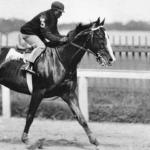
Silent Tactic Surges to Eye-Catching Score in Southwest

“Once upon a time, there was a horse named Kelso. But only once.”
Of the many lines Joe Hirsch wrote for the Daily Racing Form from 1954 until he retired as executive columnist in 2003, perhaps that one says the most about the man. Simple yet elegant, it reflects Hirsch’s immense respect for the noble Kelso and his standing in a tradition-rich sport.
Hirsch would not have been much for tweeting. He was not a strident reporter, quick to blast others while calling attention to himself. He was perfect for his time, an age when he produced one well-written piece after another on his Royal typewriter as part of a kinder, gentler era. His emphasis was on conveying the beauty of the sport, not its warts.
“Joe wasn’t what we now think of as a hard-hitting journalist. Joe was not looking to turn over rocks or find any problems in racing,” said Steven Crist, longtime publisher of and columnist at the Daily Racing Form. “He took very seriously his role as ambassador for the sport.”

Hirsch was known for the hours he spent moving from barn to barn, talking to anyone and everyone to make certain he was current on the latest developments. The relationships he forged during that process served him and his loyal readers well for decades.
“That was Joe’s whole thing, being a ground-level guy,” Crist said. “At every track in America, they knew the guy with the trench coat and dark glasses and it was, ‘Wow, Joe Hirsch has come to town.’ “
Wherever Hirsch went, he was received with respect and affection. When Sonny Werblin owned the New York Jets, he thought so much of Hirsch that he asked him to look after Joe Namath, his young and flamboyant quarterback, by having him as a roommate.
“One thing Joe personified was class. He had it,” said Jim Gluckson, a veteran publicist.
Hirsch took it upon himself to mentor young reporters and those still finding their way in racing. “He was concerned about the industry. He wanted to see the game always get better,” Gluckson said. “He would take you aside as a publicist or racing official and let you know if something wasn’t done correctly.”
When Dave Johnson became a track announcer for the New York Racing Association, Hirsch insisted they celebrate with dinner in Manhattan. A long-lasting friendship began.
Although Johnson was vacationing in London, he swiftly responded to a request for an interview when he knew Hirsch was the subject of the article.
“I’m walking down memory lane with a smile on my face,” said Johnson, who hosts a show every Saturday on Sirius XM Satellite Radio. “He was an incredible, wonderful man.”
Johnson recalled a stormy night at Turfway Park in Florence, Ky., when former president Gerald Ford was there to salute the winner of the President’s Cup. A controversial finish led to a lengthy inquiry. By the time the stewards made their decision, the only person available to Ford to accept the trophy was the jockey who had been disqualified.
“It’s another presidential pardon,” Hirsch told Johnson.
Hirsch lived as fully as possible. He frequented the finest restaurants, and his guests were entertained by his quick wit, his many anecdotes, and his insight. He urged everyone to enjoy dessert. “It couldn’t hurt a baby,” he would say.

The Media Roll of Honor at the National Museum of Racing and Hall of Fame in Saratoga Springs, N.Y., is named after Hirsch. He received virtually every honor the sport can bestow, including the Big Sport of Turfdom Award (1983), the Jockey Club Medal (1989), and the Eclipse Award of Merit (1992).
He battled Parkinson’s disease for more than 20 years. It slowed him greatly, yet he fought on.
“I’ve never seen anyone work as sick as he was,” Crist said. “He would sit in the press box and take hours to write a story and minutes to hit a single key. But he was absolutely determined to do it for as long as he could.”
Hirsch died of complications of Parkinson’s disease on Jan. 9, 2009, leaving behind a body of work that will never be forgotten.
Fun Facts